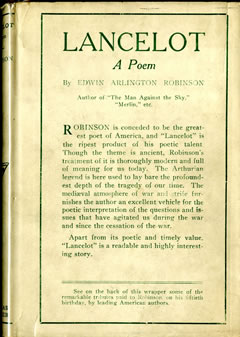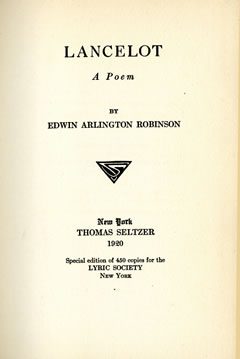Lancelot: A Poem
You may click on the thumbnail images to view them full screen


Robinson, Edwin Arlington. Lancelot: A Poem. New York: Thomas Seltzer, 1920. (One of 450 copies for the Lyric Society.) (This copy has an inscription by Robinson.)
Edwin Arlington Robinson (1869-1935) makes Camelot a symbol of the modern world in his long poem Lancelot. Robinson's poem comments on war and destruction and the end of personal dreams with an obvious contemporary application. The most important thematic element in the poem is the Light that haunts Lancelot. The Light is, in terms of the traditional story, the light of the Grail; but in Robinson's interpretation it is demystified into a kind of moral goal, though still difficult to attain. On the quest for the Grail, Lancelot was 'blinded' by the Light and now feels 'There is no place for me save where the Light / May lead me.' And yet, as Guinevere perceptively comments, 'There is a Light that you fear more today / Than all the darkness that has ever been.' What Lancelot fears is the total commitment that following the Light requires. As in Malory, following this light means abandoning his love for Guinevere. As she says to him, 'Another light, a longer time ago, / Was living in your eyes, and we were happy.' This lower-case 'light' is, of course, the light of his love for her, which distracts him from his pursuit of the loftier ideal. It is a sign of how divided Lancelot is that ultimately, despite his near obsession with the Light, Guinevere, who is far more decisive than he, must make the decision that allows him to pursue the spiritual goal. Even when she enters the convent at Almesbury, Lancelot goes to her and asks her to journey with him to France. She is the one who must decline.
In Lancelot, Robinson suggests a formula for the improvement or advancement of the world. It is one of Robinson's innovations that he looks on Camelot not as an ideal but as a stage in the development of the world. Gawain tells Lancelot, 'you might have had no Gleam had I been King, / Or had the Queen been like some queens I knew.' As in Tennyson's Idylls, there is a sense that in some ways Arthur's kingdom took people a step beyond where they were, but that step was surely not a final one; further evolution is necessary.